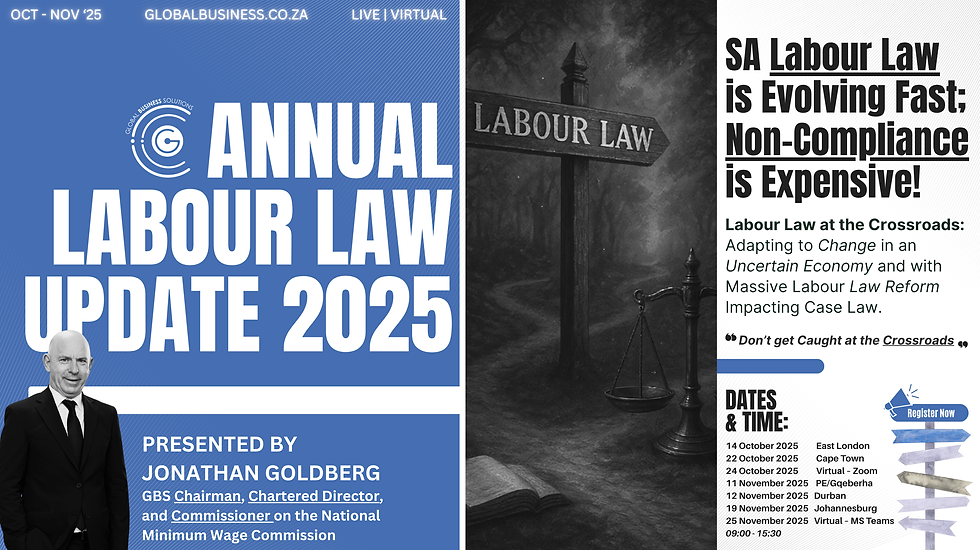AUTOMATICALLY UNFAIR DISMISSAL – RETIREMENT AGE
- Jonathan Goldberg

- Sep 11, 2025
- 3 min read

In the matter of MISA AND ANOTHER V GREAT SOUTH AUTOBODY CC T/A GREAT SOUTH PANELBEATERS [2024] ZACC 29 the Constitutional Court (CC) considered whether the dismissal of an employee on the basis of age was automatically unfair in terms of section 187(1)(f) of the Labour Relations Act 66 of 1995 (LRA) when the dismissal took place months after the employee had reached the agreed retirement age.
The employee’s written contract of employment specified a retirement age of 60. The employee turned 60 on 15 March 2018 but continued to work and receive his full salary without objection or reference to retirement. It was only 10 months later that the employer gave notice terminating his employment on 12 February 2019 due to his reaching the retirement age.
The employee and the Motor Industry Staff Association (MISA) contended that by allowing him to work beyond 60 without enforcing retirement, the employer had either waived its right to rely on the retirement clause, amended the contract tacitly, or created a new employment contract without a fixed retirement age. They argued that the dismissal amounted to unfair age discrimination and was thus automatically unfair under section 187(1)(f) of the LRA. The employer, however, maintained that the dismissal was fair under section 187(2)(b), which permits age-based dismissal if the employee has reached the normal or agreed retirement age.
The Labour Court and Labour Appeal Court (LAC) both ruled in favour of the employer and held that an employer could still fairly dismiss an employee on the basis of age even if the dismissal occurred after the employee had continued working beyond the agreed retirement age.
In the CC, the Chief Justice and three other judges found that dismissal on the basis of age is fair only if it occurs on the date the employee reaches the agreed retirement age, they were in the minority. They held that dismissing an employee after allowing them to continue working constituted automatically unfair dismissal.
A fifth judge approached the matter differently, holding that an employer must exercise its right to retire an employee within a reasonable time of reaching the agreed retirement age. Delay could be interpreted as a waiver of that right, depending on whether the employer knew the legal implications of such delay.
The remaining four judges confirmed that section 187(2)(b) permits employers to dismiss employees on the basis of age at any point after they reach the agreed retirement age, provided reasonable notice is given. This position does not require a hearing prior to dismissal but recommends it as good practice.
Thus, while the Constitutional Court was divided on the meaning of section 187(2)(b), the outcome in the employee’s case was that his dismissal was not automatically unfair, and the LAC’s ruling in favour of the employer stood. There were no costs order made.
Join us at the Annual Labour Law Update. This year's theme is Labour Law at the Crossroads: Adapting to Change in an Uncertain Economy and with Massive Labour Law Reform Impacting Case Law. What you'll gain:
Master the Digital Transformation of Labour Law in 2025
200+ Labour Law Cases Unpacked by Jonathan Goldberg
Critical Updates on Upcoming Legislation & NEDLAC Amendments
Navigate Workplace Challenges from the Digital Era to Discrimination Laws

View our upcoming events: Upcoming Events, like the Pop-Up on the New Code of Good Practice on Dismissal, Diversity and Inclusion training, Employment Equity with PoE, or Effective Strike Management.
*All workshops are offered as customised in-house training that can be presented virtually or on-site.
"Global Business Solutions (GBS)—Your Partner in Strategic HR Compliance"










Comments